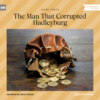Czytaj książkę: «The Innocents Abroad», strona 25
The Grand Duke’s tea was delicious. They give one a lemon to squeeze into it, or iced milk, if he prefers it. The former is best. This tea is brought overland from China. It injures the article to transport it by sea.
When it was time to go, we bade our distinguished hosts good-bye, and they retired happy and contented to their apartments to count their spoons.
We had spent the best part of half a day in the home of royalty, and had been as cheerful and comfortable all the time as we could have been in the ship. I would as soon have thought of being cheerful in Abraham’s bosom as in the palace of an Emperor. I supposed that Emperors were terrible people. I thought they never did any thing but wear magnificent crowns and red velvet dressing-gowns with dabs of wool sewed on them in spots, and sit on thrones and scowl at the flunkies and the people in the parquette, and order Dukes and Duchesses off to execution. I find, however, that when one is so fortunate as to get behind the scenes and see them at home and in the privacy of their firesides, they are strangely like common mortals. They are pleasanter to look upon then than they are in their theatrical aspect. It seems to come as natural to them to dress and act like other people as it is to put a friend’s cedar pencil in your pocket when you are done using it. But I can never have any confidence in the tinsel kings of the theatre after this. It will be a great loss. I used to take such a thrilling pleasure in them. But, hereafter, I will turn me sadly away and say;
“This does not answer – this isn’t the style of king that I am acquainted with."
When they swagger around the stage in jeweled crowns and splendid robes, I shall feel bound to observe that all the Emperors that ever I was personally acquainted with wore the commonest sort of clothes, and did not swagger. And when they come on the stage attended by a vast body-guard of supes in helmets and tin breastplates, it will be my duty as well as my pleasure to inform the ignorant that no crowned head of my acquaintance has a soldier any where about his house or his person.
Possibly it may be thought that our party tarried too long, or did other improper things, but such was not the case. The company felt that they were occupying an unusually responsible position – they were representing the people of America, not the Government – and therefore they were careful to do their best to perform their high mission with credit.
On the other hand, the Imperial families, no doubt, considered that in entertaining us they were more especially entertaining the people of America than they could by showering attentions on a whole platoon of ministers plenipotentiary and therefore they gave to the event its fullest significance, as an expression of good will and friendly feeling toward the entire country. We took the kindnesses we received as attentions thus directed, of course, and not to ourselves as a party. That we felt a personal pride in being received as the representatives of a nation, we do not deny; that we felt a national pride in the warm cordiality of that reception, can not be doubted.
Our poet has been rigidly suppressed, from the time we let go the anchor. When it was announced that we were going to visit the Emperor of Russia, the fountains of his great deep were broken up, and he rained ineffable bosh for four-and-twenty hours. Our original anxiety as to what we were going to do with ourselves, was suddenly transformed into anxiety about what we were going to do with our poet. The problem was solved at last. Two alternatives were offered him – he must either swear a dreadful oath that he would not issue a line of his poetry while he was in the Czar’s dominions, or else remain under guard on board the ship until we were safe at Constantinople again. He fought the dilemma long, but yielded at last. It was a great deliverance. Perhaps the savage reader would like a specimen of his style. I do not mean this term to be offensive. I only use it because “the gentle reader” has been used so often that any change from it can not but be refreshing:
“Save us and sanctify us, and finally, then,
See good provisions we enjoy while we journey to Jerusalem.
For so man proposes, which it is most true
And time will wait for none, nor for us too."
The sea has been unusually rough all day. However, we have had a lively time of it, anyhow. We have had quite a run of visitors. The Governor-General came, and we received him with a salute of nine guns. He brought his family with him. I observed that carpets were spread from the pier-head to his carriage for him to walk on, though I have seen him walk there without any carpet when he was not on business. I thought may be he had what the accidental insurance people might call an extra-hazardous polish (“policy” joke, but not above mediocrity,) on his boots, and wished to protect them, but I examined and could not see that they were blacked any better than usual. It may have been that he had forgotten his carpet, before, but he did not have it with him, anyhow. He was an exceedingly pleasant old gentleman; we all liked him, especially Blucher. When he went away, Blucher invited him to come again and fetch his carpet along.
Prince Dolgorouki and a Grand Admiral or two, whom we had seen yesterday at the reception, came on board also. I was a little distant with these parties, at first, because when I have been visiting Emperors I do not like to be too familiar with people I only know by reputation, and whose moral characters and standing in society I can not be thoroughly acquainted with. I judged it best to be a little offish, at first. I said to myself, Princes and Counts and Grand Admirals are very well, but they are not Emperors, and one can not be too particular about who he associates with.
Baron Wrangel came, also. He used to be Russian Ambassador at Washington. I told him I had an uncle who fell down a shaft and broke himself in two, as much as a year before that. That was a falsehood, but then I was not going to let any man eclipse me on surprising adventures, merely for the want of a little invention. The Baron is a fine man, and is said to stand high in the Emperor’s confidence and esteem.
Baron Ungern-Sternberg, a boisterous, whole-souled old nobleman, came with the rest. He is a man of progress and enterprise – a representative man of the age. He is the Chief Director of the railway system of Russia – a sort of railroad king. In his line he is making things move along in this country He has traveled extensively in America. He says he has tried convict labor on his railroads, and with perfect success. He says the convicts work well, and are quiet and peaceable. He observed that he employs nearly ten thousand of them now.
This appeared to be another call on my resources. I was equal to the emergency. I said we had eighty thousand convicts employed on the railways in America – all of them under sentence of death for murder in the first degree. That closed him out.
We had General Todtleben (the famous defender of Sebastopol, during the siege,) and many inferior army and also navy officers, and a number of unofficial Russian ladies and gentlemen. Naturally, a champagne luncheon was in order, and was accomplished without loss of life. Toasts and jokes were discharged freely, but no speeches were made save one thanking the Emperor and the Grand Duke, through the Governor-General, for our hospitable reception, and one by the Governor-General in reply, in which he returned the Emperor’s thanks for the speech, etc., etc.
CHAPTER XXXVIII
We returned to Constantinople, and after a day or two spent in exhausting marches about the city and voyages up the Golden Horn in caiques, we steamed away again. We passed through the Sea of Marmora and the Dardanelles, and steered for a new land – a new one to us, at least – Asia. We had as yet only acquired a bowing acquaintance with it, through pleasure excursions to Scutari and the regions round about.
We passed between Lemnos and Mytilene, and saw them as we had seen Elba and the Balearic Isles – mere bulky shapes, with the softening mists of distance upon them – whales in a fog, as it were. Then we held our course southward, and began to “read up” celebrated Smyrna.
At all hours of the day and night the sailors in the forecastle amused themselves and aggravated us by burlesquing our visit to royalty. The opening paragraph of our Address to the Emperor was framed as follows:
“We are a handful of private citizens of America, traveling simply for recreation – and unostentatiously, as becomes our unofficial state – and, therefore, we have no excuse to tender for presenting ourselves before your Majesty, save the desire of offering our grateful acknowledgments to the lord of a realm, which, through good and through evil report, has been the steadfast friend of the land we love so well.”
The third cook, crowned with a resplendent tin basin and wrapped royally in a table-cloth mottled with grease-spots and coffee stains, and bearing a sceptre that looked strangely like a belaying-pin, walked upon a dilapidated carpet and perched himself on the capstan, careless of the flying spray; his tarred and weather-beaten Chamberlains, Dukes and Lord High Admirals surrounded him, arrayed in all the pomp that spare tarpaulins and remnants of old sails could furnish. Then the visiting “watch below,” transformed into graceless ladies and uncouth pilgrims, by rude travesties upon waterfalls, hoopskirts, white kid gloves and swallow-tail coats, moved solemnly up the companion way, and bowing low, began a system of complicated and extraordinary smiling which few monarchs could look upon and live. Then the mock consul, a slush-plastered deck-sweep, drew out a soiled fragment of paper and proceeded to read, laboriously:
“To His Imperial Majesty, Alexander II., Emperor of Russia:
“We are a handful of private citizens of America, traveling simply for recreation, – and unostentatiously, as becomes our unofficial state – and therefore, we have no excuse to tender for presenting ourselves before your Majesty – ”
The Emperor – “Then what the devil did you come for?”
– “Save the desire of offering our grateful acknowledgments to the lord of a realm which – ”
The Emperor – “Oh, d – n the Address! – read it to the police. Chamberlain, take these people over to my brother, the Grand Duke’s, and give them a square meal. Adieu! I am happy – I am gratified – I am delighted – I am bored. Adieu, adieu – vamos the ranch! The First Groom of the Palace will proceed to count the portable articles of value belonging to the premises."
The farce then closed, to be repeated again with every change of the watches, and embellished with new and still more extravagant inventions of pomp and conversation.
At all times of the day and night the phraseology of that tiresome address fell upon our ears. Grimy sailors came down out of the foretop placidly announcing themselves as “a handful of private citizens of America, traveling simply for recreation and unostentatiously,” etc.; the coal passers moved to their duties in the profound depths of the ship, explaining the blackness of their faces and their uncouthness of dress, with the reminder that they were “a handful of private citizens, traveling simply for recreation,” etc., and when the cry rang through the vessel at midnight: “EIGHT BELLS! – LARBOARD WATCH, TURN OUT!” the larboard watch came gaping and stretching out of their den, with the everlasting formula: “Aye-aye, sir! We are a handful of private citizens of America, traveling simply for recreation, and unostentatiously, as becomes our unofficial state!”
As I was a member of the committee, and helped to frame the Address, these sarcasms came home to me. I never heard a sailor proclaiming himself as a handful of American citizens traveling for recreation, but I wished he might trip and fall overboard, and so reduce his handful by one individual, at least. I never was so tired of any one phrase as the sailors made me of the opening sentence of the Address to the Emperor of Russia.
This seaport of Smyrna, our first notable acquaintance in Asia, is a closely packed city of one hundred and thirty thousand inhabitants, and, like Constantinople, it has no outskirts. It is as closely packed at its outer edges as it is in the centre, and then the habitations leave suddenly off and the plain beyond seems houseless. It is just like any other Oriental city. That is to say, its Moslem houses are heavy and dark, and as comfortless as so many tombs; its streets are crooked, rudely and roughly paved, and as narrow as an ordinary staircase; the streets uniformly carry a man to any other place than the one he wants to go to, and surprise him by landing him in the most unexpected localities; business is chiefly carried on in great covered bazaars, celled like a honeycomb with innumerable shops no larger than a common closet, and the whole hive cut up into a maze of alleys about wide enough to accommodate a laden camel, and well calculated to confuse a stranger and eventually lose him; every where there is dirt, every where there are fleas, every where there are lean, broken-hearted dogs; every alley is thronged with people; wherever you look, your eye rests upon a wild masquerade of extravagant costumes; the workshops are all open to the streets, and the workmen visible; all manner of sounds assail the ear, and over them all rings out the muezzin’s cry from some tall minaret, calling the faithful vagabonds to prayer; and superior to the call to prayer, the noises in the streets, the interest of the costumes – superior to every thing, and claiming the bulk of attention first, last, and all the time – is a combination of Mohammedan stenches, to which the smell of even a Chinese quarter would be as pleasant as the roasting odors of the fatted calf to the nostrils of the returning Prodigal. Such is Oriental luxury – such is Oriental splendor! We read about it all our days, but we comprehend it not until we see it. Smyrna is a very old city. Its name occurs several times in the Bible, one or two of the disciples of Christ visited it, and here was located one of the original seven apocalyptic churches spoken of in Revelations. These churches were symbolized in the Scriptures as candlesticks, and on certain conditions there was a sort of implied promise that Smyrna should be endowed with a “crown of life.” She was to “be faithful unto death” – those were the terms. She has not kept up her faith straight along, but the pilgrims that wander hither consider that she has come near enough to it to save her, and so they point to the fact that Smyrna to-day wears her crown of life, and is a great city, with a great commerce and full of energy, while the cities wherein were located the other six churches, and to which no crown of life was promised, have vanished from the earth. So Smyrna really still possesses her crown of life, in a business point of view. Her career, for eighteen centuries, has been a chequered one, and she has been under the rule of princes of many creeds, yet there has been no season during all that time, as far as we know, (and during such seasons as she was inhabited at all,) that she has been without her little community of Christians “faithful unto death.” Hers was the only church against which no threats were implied in the Revelations, and the only one which survived.
With Ephesus, forty miles from here, where was located another of the seven churches, the case was different. The “candlestick” has been removed from Ephesus. Her light has been put out. Pilgrims, always prone to find prophecies in the Bible, and often where none exist, speak cheerfully and complacently of poor, ruined Ephesus as the victim of prophecy. And yet there is no sentence that promises, without due qualification, the destruction of the city. The words are:
“Remember, therefore, from whence thou art fallen, and repent, and do the first works; or else I will come unto thee quickly, and will remove thy candlestick out of his place, except thou repent.”
That is all; the other verses are singularly complimentary to Ephesus. The threat is qualified. There is no history to show that she did not repent. But the cruelest habit the modern prophecy-savans have, is that one of coolly and arbitrarily fitting the prophetic shirt on to the wrong man. They do it without regard to rhyme or reason. Both the cases I have just mentioned are instances in point. Those “prophecies” are distinctly leveled at the “churches of Ephesus, Smyrna,” etc., and yet the pilgrims invariably make them refer to the cities instead. No crown of life is promised to the town of Smyrna and its commerce, but to the handful of Christians who formed its “church.” If they were “faithful unto death,” they have their crown now – but no amount of faithfulness and legal shrewdness combined could legitimately drag the city into a participation in the promises of the prophecy. The stately language of the Bible refers to a crown of life whose lustre will reflect the day-beams of the endless ages of eternity, not the butterfly existence of a city built by men’s hands, which must pass to dust with the builders and be forgotten even in the mere handful of centuries vouchsafed to the solid world itself between its cradle and its grave.
The fashion of delving out fulfillments of prophecy where that prophecy consists of mere “ifs,” trenches upon the absurd. Suppose, a thousand years from now, a malarious swamp builds itself up in the shallow harbor of Smyrna, or something else kills the town; and suppose, also, that within that time the swamp that has filled the renowned harbor of Ephesus and rendered her ancient site deadly and uninhabitable to-day, becomes hard and healthy ground; suppose the natural consequence ensues, to wit: that Smyrna becomes a melancholy ruin, and Ephesus is rebuilt. What would the prophecy-savans say? They would coolly skip over our age of the world, and say: “Smyrna was not faithful unto death, and so her crown of life was denied her; Ephesus repented, and lo! her candle-stick was not removed. Behold these evidences! How wonderful is prophecy!”
Smyrna has been utterly destroyed six times. If her crown of life had been an insurance policy, she would have had an opportunity to collect on it the first time she fell. But she holds it on sufferance and by a complimentary construction of language which does not refer to her. Six different times, however, I suppose some infatuated prophecy-enthusiast blundered along and said, to the infinite disgust of Smyrna and the Smyrniotes: “In sooth, here is astounding fulfillment of prophecy! Smyrna hath not been faithful unto death, and behold her crown of life is vanished from her head. Verily, these things be astonishing!”
Such things have a bad influence. They provoke worldly men into using light conversation concerning sacred subjects. Thick-headed commentators upon the Bible, and stupid preachers and teachers, work more damage to religion than sensible, cool-brained clergymen can fight away again, toil as they may. It is not good judgment to fit a crown of life upon a city which has been destroyed six times. That other class of wiseacres who twist prophecy in such a manner as to make it promise the destruction and desolation of the same city, use judgment just as bad, since the city is in a very flourishing condition now, unhappily for them. These things put arguments into the mouth of infidelity.
A portion of the city is pretty exclusively Turkish; the Jews have a quarter to themselves; the Franks another quarter; so, also, with the Armenians. The Armenians, of course, are Christians. Their houses are large, clean, airy, handsomely paved with black and white squares of marble, and in the centre of many of them is a square court, which has in it a luxuriant flower-garden and a sparkling fountain; the doors of all the rooms open on this. A very wide hall leads to the street door, and in this the women sit, the most of the day. In the cool of the evening they dress up in their best raiment and show themselves at the door. They are all comely of countenance, and exceedingly neat and cleanly; they look as if they were just out of a band-box. Some of the young ladies – many of them, I may say – are even very beautiful; they average a shade better than American girls – which treasonable words I pray may be forgiven me. They are very sociable, and will smile back when a stranger smiles at them, bow back when he bows, and talk back if he speaks to them. No introduction is required. An hour’s chat at the door with a pretty girl one never saw before, is easily obtained, and is very pleasant. I have tried it. I could not talk anything but English, and the girl knew nothing but Greek, or Armenian, or some such barbarous tongue, but we got along very well. I find that in cases like these, the fact that you can not comprehend each other isn’t much of a drawback. In that Russia n town of Yalta I danced an astonishing sort of dance an hour long, and one I had not heard of before, with a very pretty girl, and we talked incessantly, and laughed exhaustingly, and neither one ever knew what the other was driving at. But it was splendid. There were twenty people in the set, and the dance was very lively and complicated. It was complicated enough without me – with me it was more so. I threw in a figure now and then that surprised those Russians. But I have never ceased to think of that girl. I have written to her, but I can not direct the epistle because her name is one of those nine-jointed Russian affairs, and there are not letters enough in our alphabet to hold out. I am not reckless enough to try to pronounce it when I am awake, but I make a stagger at it in my dreams, and get up with the lockjaw in the morning. I am fading. I do not take my meals now, with any sort of regularity. Her dear name haunts me still in my dreams. It is awful on teeth. It never comes out of my mouth but it fetches an old snag along with it. And then the lockjaw closes down and nips off a couple of the last syllables – but they taste good.
Coming through the Dardanelles, we saw camel trains on shore with the glasses, but we were never close to one till we got to Smyrna. These camels are very much larger than the scrawny specimens one sees in the menagerie. They stride along these streets, in single file, a dozen in a train, with heavy loads on their backs, and a fancy-looking negro in Turkish costume, or an Arab, preceding them on a little donkey and completely overshadowed and rendered insignificant by the huge beasts. To see a camel train laden with the spices of Arabia and the rare fabrics of Persia come marching through the narrow alleys of the bazaar, among porters with their burdens, money-changers, lamp-merchants, Al-naschars in the glassware business, portly cross-legged Turks smoking the famous narghili; and the crowds drifting to and fro in the fanciful costumes of the East, is a genuine revelation of the Orient.
The picture lacks nothing. It casts you back at once into your forgotten boyhood, and again you dream over the wonders of the Arabian Nights; again your companions are princes, your lord is the Caliph Haroun Al Raschid, and your servants are terrific giants and genii that come with smoke and lightning and thunder, and go as a storm goes when they depart!




















